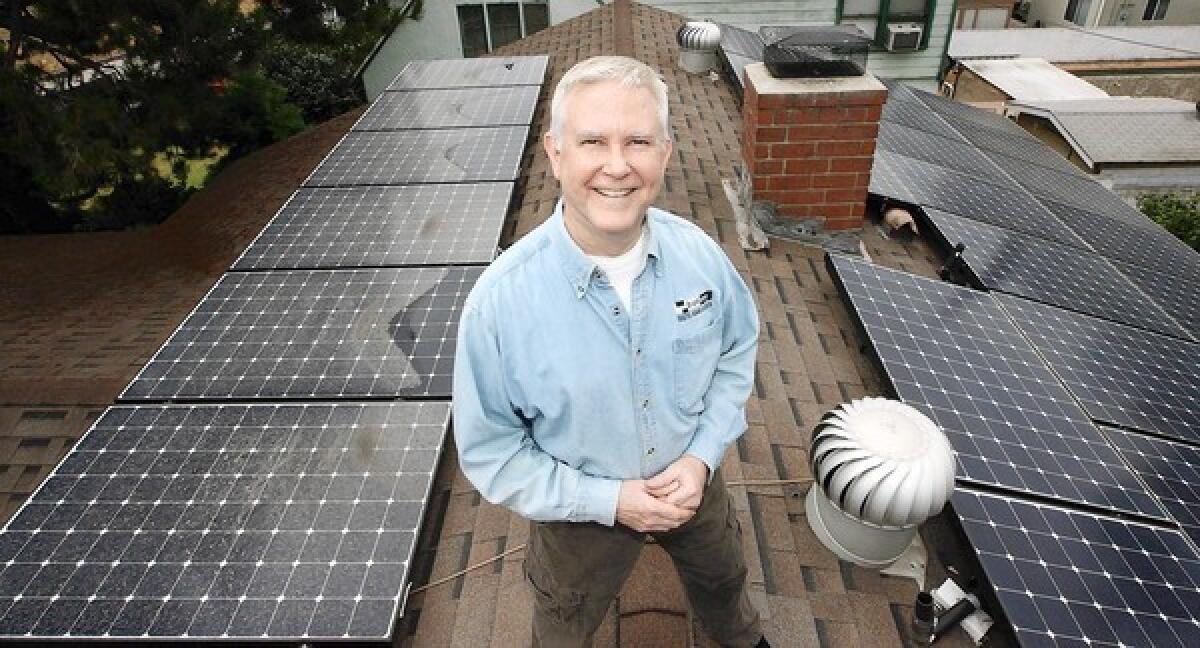Energy-saving rebates in high demand for Glendale, Burbank

- Share via
Les Perkins is used to paying roughly $400 every two months to Glendale Water & Power, but his latest electricity bill was markedly different. He owed just $85.
“I started giggling with glee,” he said.
Perkins runs a video-editing company out of his Rancho-Riverside home and the air conditioning and computer equipment can run up his electricity bills. But his green upgrade last September didn’t cost him anything upfront because of a popular city subsidy and a leasing program offered by his installer.
However, Perkins had to wait six months before his solar installer could get the subsidy because demand for the city’s solar rebates continually outstrips the program’s budget.
____________
FOR THE RECORD: The photo caption in an earlier version of this story incorrectly stated that Les Perkins installed the solar panels himself. In fact, he had them installed.
____________
The waiting time varies, but as of this week, all money set aside for rebates this year — $1.5 million — has already been reserved, so if someone applied today, they would have to wait a year, or until someone who has already been approved drops out.
Despite the demand, there are no plans to increase the rebate budget. To do so, city officials would either have to take money from other benefit programs, such as utility subsidies for low-income customers and planting free shade trees, or increase the 3.6% “public benefits charge” that comes with every bill.
“We can’t forget that money doesn’t just appear. It comes from the ratepayers,” said Councilwoman Laura Friedman, adding that she would like to increase the solar rebates, but council members have to be “mindful of the effect that would have on everyone in the city.”
And at a time when the council is set to consider electricity rate increases that will total 24% over five years, with the first bump at 8% in August, now may not be a good time to hike the public benefits charge.
“That’s why I’m a little hesitant to increase the rebate portion,” said Councilman Ara Najarian. He added that some residents already complain about paying for subsidy programs.
The public benefits charge nets about $6 million annually, with about a quarter earmarked for solar rebates.
This fiscal year, 98 projects were approved. Forty-four of the projects came from last year’s waiting list and the rest were approved on July 1, the beginning of the fiscal year, on a first-come, first-served basis, said Atineh Haroutunian, spokeswoman for Glendale Water & Power.
Glendale typically runs out of solar rebate funding early in the fiscal year, which is when the waiting list kicks in.
Since 2002, Glendale Water & Power has provided $6.5 million in rebates to 330 customers, Haroutunian said. The average cost of a residential installation is $32,820 and the average Glendale rebate is $9,860, she added.
Glendale’s solar rebate program is not the only one getting squeezed by high demand. Burbank Water & Power runs a lottery system for its program, and although 65 residential projects applied for a rebate, only 10 were approved last year.
Burbank has $1 million to fund 50 residential and 10 commercial installations this fiscal year, said Burbank Water & Power spokesman Joe Flores.
Solar installers said they’ve had difficulties tapping Glendale and Burbank’s solar rebate programs while those offered by investor-owned utilities, such as Southern California Edison, have been easier to get.
“Usually the public utilities are a little bit slower,” said Yaar Kimhi, general manager of High Star Solar Construction, which installed Perkins’ panels.
High Star Solar took the rebate and then reduced Perkins’ monthly lease payments over the equipment’s 20-year lifespan. Those who buy panels outright pay upfront and then get a rebate from the city, while the upfront costs for those who lease tend to be covered by the installers.
Perkins pays about $130 a month to lease the panels. But even adding that to his electricity bill, he still pays less than if he didn’t have the panels.
Scott Colton, an arts conservator, tried to apply for the solar panel rebate about two years ago, but he was told the waiting list was full. Colton, who lives in the foothills in the Woodbury neighborhood, was so discouraged, he never tried to apply again.
“I was at the point where the city wouldn’t help and I was on my own and I couldn’t do the redo,” he said.
As for Perkins, he’s happy he got the rebate when he did.
“I’m really looking forward to my August-September bill, to go through a summer of high use and see that drop,” he said. “I’m like, really, ‘Woohoo!’”
Alene Tchekmedyian contributed to this report.
--
Follow Brittany Levine on Google+ and on Twitter: @brittanylevine.
ALSO:
L.A. bridge connecting Griffith Park, Atwater may usurp Glendale plans
iPhone stolen at gunpoint
Glendale approves Korean ‘comfort woman’ statue despite protest